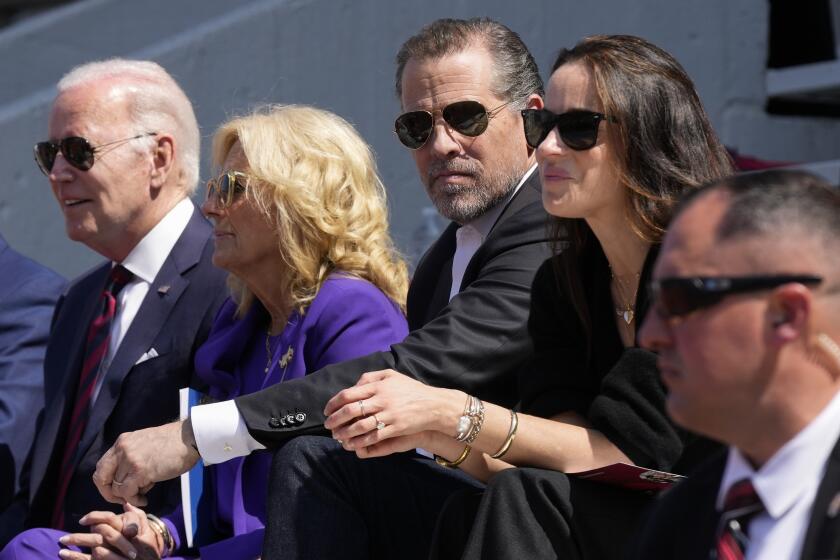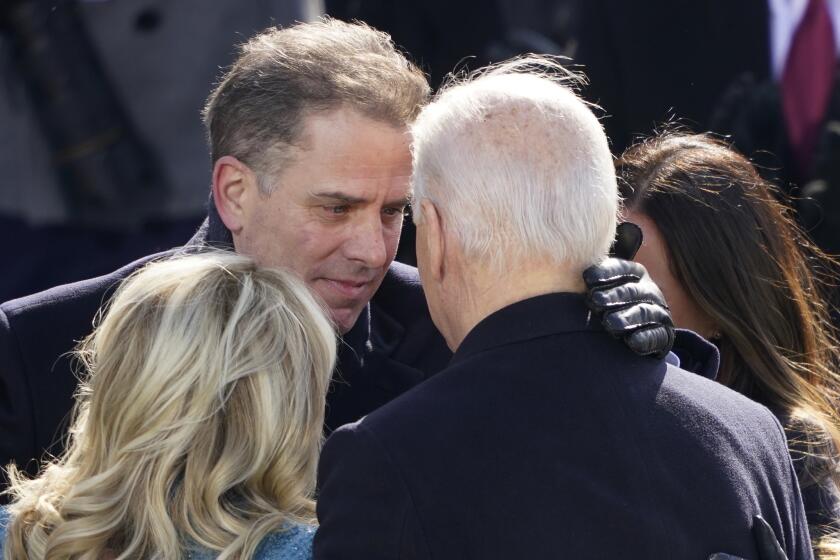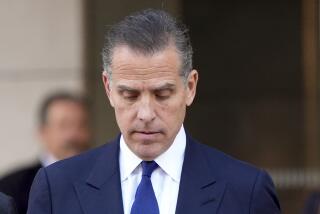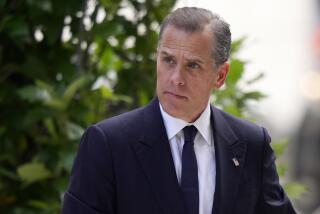Column: Hunter Biden was indicted on gun charges. Here’s the real reason he’s in trouble
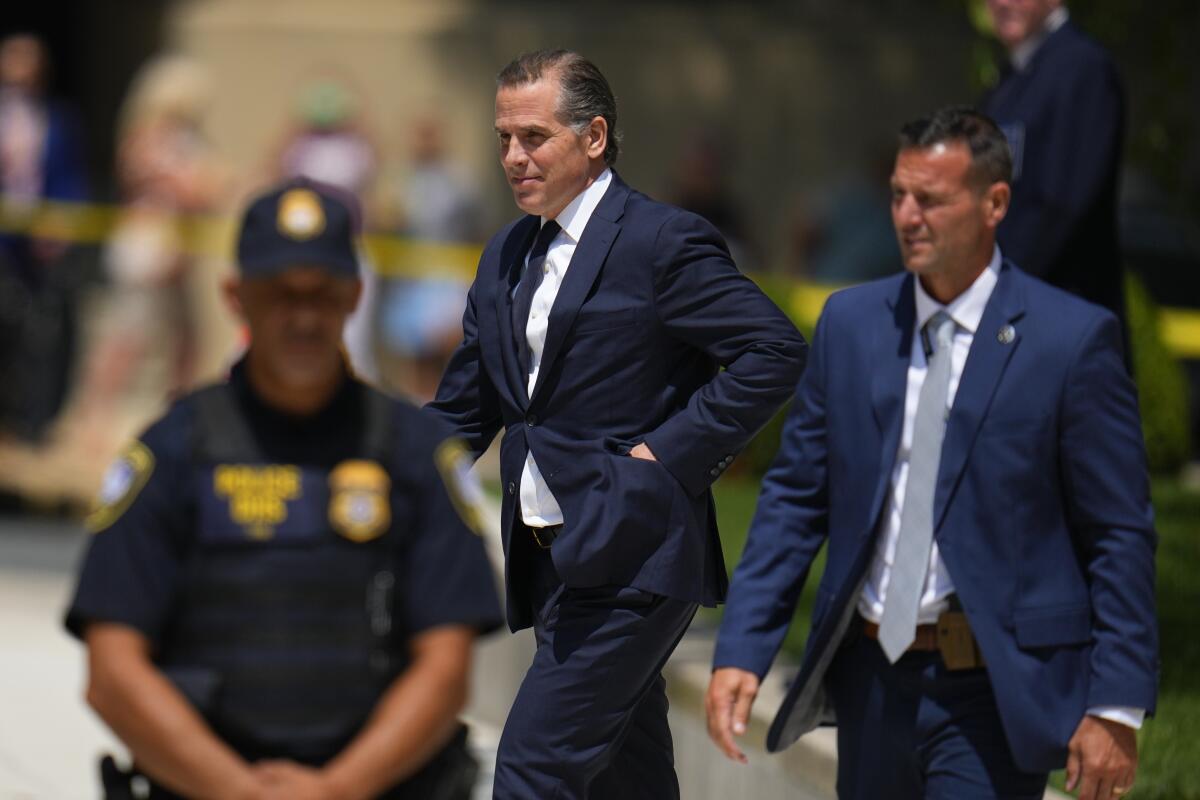
Hunter Biden was charged Thursday with three felonies related to lying on a 2018 application to buy a gun. But it’s hard not to conclude that his true offense is being the son of a president whom Republicans are hell-bent on vilifying and defeating.
The indictment largely relies on Biden’s false claim that he was not using illegal drugs when he applied to purchase the firearm. In fact, he was then in the depths of the cocaine addiction that drove a series of travails that Republicans continue to weaponize against his father.
The Justice Department had previously negotiated a plea agreement with Biden that included a gun charge following some five years of investigation by David Weiss, Trump’s U.S. attorney for Delaware, whom President Biden allowed to remain in office in a departure from standard procedure. Hunter Biden agreed to plead guilty to two misdemeanor tax offenses and enter a pretrial diversion under which the felony gun charge would be dropped if he stays on the straight and narrow for two years. Such agreements are a fairly common means of disposing of less serious charges.
Donald Trump and other Republicans have criticized the Justice Department deal with President Biden’s son on tax and gun charges. They’re off-base as usual.
The plea deal unraveled for unusual reasons having nothing to do with Biden. The parties imprudently included provisions that gave a judge legitimate misgivings about whether she was being called on to participate in a determination that Biden would not be prosecuted on other charges, assuming an executive branch function in violation of the separation of powers. The agreement was therefore taken off the table to allow for renegotiation.
But that provided an opening for a firestorm of protest on Capitol Hill from Donald Trump’s allies, who railed at the supposed sweetheart deal. As I explained at the time, however, the general outlines of the agreement amounted to a sensible resolution of a case that the Justice Department could well have lost at trial.
It has since become even more obvious that all the rancor over the deal was aimed at the president himself, whom extremists in Congress, whipped up by Trump, are spoiling to impeach. The Republicans have nothing of substance to impeach Biden for, so they are straining to connect him to the sins of his son with ill-founded conjecture. Trump and his supporters’ unhinged animus in this cause is so great that the FBI set up a special task force to deal with the unprecedented number of threats against agents and prosecutors working on the Hunter Biden case.
The clearest sign that something really stinks here is that the charges Weiss brought are rarely pursued for their own sake. The department does bring such charges against defendants who use improperly obtained firearms to commit other crimes. And in one or two instances, prosecutors appear to have used such charges against defendants whom they knew to be particularly dangerous. But this indictment over an isolated lie by a relatively harmless firearm applicant seems to be without precedent.
So why was Weiss able to pursue charges that wouldn’t normally be brought?
It’s unfair that Biden and Trump are neck and neck in the polls. But it’s not unfair that the president is taking a hit with voters because of Hunter Biden’s troubles.
If Weiss were a regular prosecutor, his decisions would be subject to a supervisory structure that would enforce Justice Department policies and equal treatment of similarly situated individuals. But amid the political outcry, the U.S. attorney petitioned Atty. Gen. Merrick Garland for special counsel status — never mind that special counsels are supposed to come from outside the department. Garland’s hand was effectively forced under the circumstances, and Weiss got what he asked for, along with a large measure of independence from normal procedures.
Antonin Scalia, most conservatives’ beau idéal of a Supreme Court justice, warned us about this.
“The independent counsel … operating in an area where so little is law and so much is discretion, is intentionally cut off from the unifying influence of the Justice Department, and from the perspective that multiple responsibilities provide,” the late justice wrote. “How frightening it must be to have your own independent counsel and staff appointed, with nothing else to do but to investigate you until investigation is no longer worthwhile.”
Although Scalia’s constitutional argument didn’t carry the day, the policy concerns he expressed led Congress to repeal the independent counsel law. It was replaced with the special counsel structure through Justice Department regulations that were meant to be more aligned with standard policy. But peculiar political events have conspired to put Weiss in much the same insulated position as the independent counsels of yore, with the same toxic results.
As for Hunter Biden, he still has some legal cards to play. His aggressive and able counsel, Abbe Lowell, will no doubt argue that the charges amount to an unlawful vindictive prosecution. And recent appellate court rulings suggesting that even felons retain their 2nd Amendment rights could cast a constitutional shadow on at least one of the gun charges.
But given that these arguments are relative long shots for Biden, it’s likely he will have to go to trial on charges that are seldom brought in the middle of a presidential contest between his father and Trump. That will give radical Republicans in Congress the talking point they need to muddy the waters with respect to Trump’s multiple criminal indictments. Weiss has given them just what they wanted.
Harry Litman is the host of the “Talking Feds” podcast. @harrylitman
More to Read
A cure for the common opinion
Get thought-provoking perspectives with our weekly newsletter.
You may occasionally receive promotional content from the Los Angeles Times.
